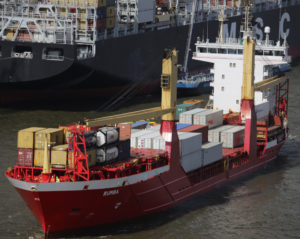
Australia Cracking Down on High-Risk Stink Bugs

The biggest reason why people opt for choosing container shipping, besides being cost-effective in nature, is the level of safety it provides when transporting goods by sea. That is not to say, however, that it is without risk altogether.
An incident at sea is always a possibility, and marine insurance is the best way to mitigate these risks and protect yourself while shipping items on the water.
What does marine insurance do?
Marine insurance is a type of cover that applies to the loss of or damage to cargo between ports of origin and final destinations via sea. It is designed to minimise any financial loss caused by an accident or natural hazard while transporting goods by water.
You would take out one of these policies to protect items such as containerised cargo (whether full or part of container), and break bulk cargo (cargo transported on the deck of a vessel). It also covers the handling of these types of cargo.
Marine insurance is used to protect onshore and offshore exposed property, too. It offers coverage for your cargo while it is held in container terminals, ports, pipelines, and other similar areas.
The risks of sending goods by sea
When transporting goods via sea freight, there are more risks than just an accident with the vessel. You also need to consider things like poorly designed packaging that cannot handle the rigours of shipping, as well as potential theft or improper handling – all of which put your goods at risk of loss or damage.
Maritime insurance also provides cover for the vessel itself. Boats face hazards during transportation such as running aground and becoming stranded, experiencing a fire, a collision with another vessel, or a natural disaster occurring.
The cost of not having marine insurance
Cargo that arrives damaged, or is stolen, results in financial loss that can be severe to your business.
It is important to keep in mind that if things go wrong at sea and your cargo is damaged or lost, you likely can not afford
to absorb the costs involved. Salvaging a container is expensive and complicated, and the costs associated with recovery will eat into the value of the cargo – if it is even recovered at all.
Why aren’t these losses covered by the transportation company?
This is a fair question, as you are paying for a service, and the improper delivery of your goods means that the service has not been delivered. However, it is not as black and white as you would think.
Maritime law dictates a process called General Average, which shares financial liability across all parties involved. If a vessel is lost at sea while your container is on board, you will not be reimbursed for your goods. This is just another reason why marine insurance is so vital.
The frequency and severity of extreme weather is becoming more common as well, putting a higher number of vessels at risk. In 2017, Allianz reported that 94 vessels were declared a total loss. Without marine insurance, you are leaving your cargo and vessel at the mercy of mother nature. There is no chance for compensation for loss or damage that is the result of weather-related occurances.
Play it safe with marine insurance
You would not risk your vehicle by not insuring it, and you should apply the same rules to your vessel and goods when sending them by sea. Marine insurance is worth it when you consider the high costs that are incurred when something goes wrong. Do not risk your livelihood by not protecting your cargo or your ship.
Talk to the Experts
Navigating the different marine insurance policies to find the most suitable for your needs can be difficult, so for expert advice to ensure you choose the best cover, talk to the team here at End To End Customs Pty Ltd.
Our brokers are experienced in helping businesses like yours protect themselves when transporting freight by sea. If utilising our freight forwarding or Customs broker service ask about adding on marine insurance, get in touch with us today to find out more.




